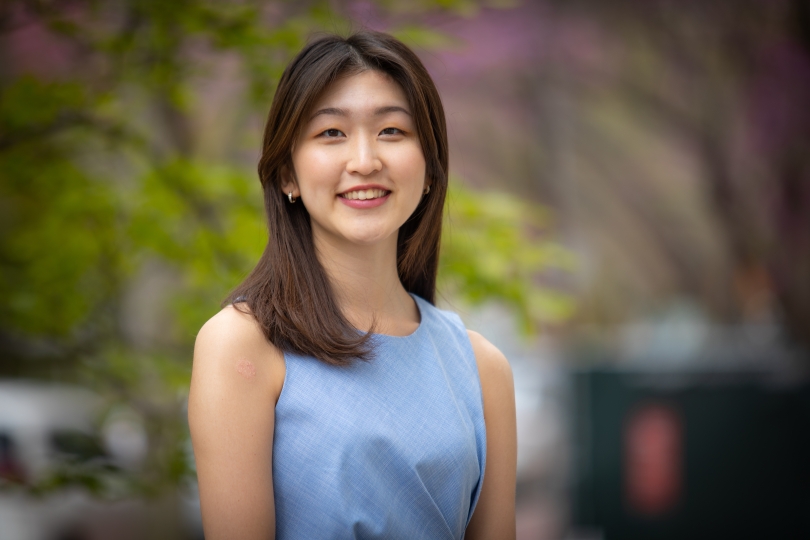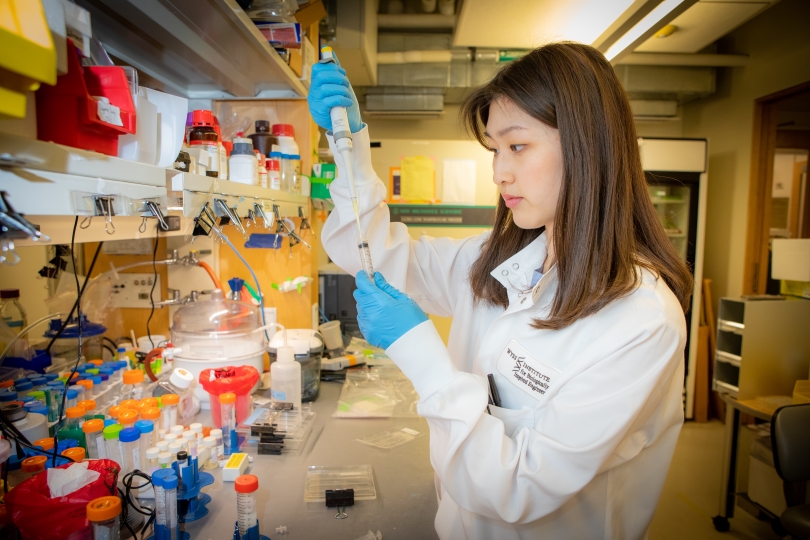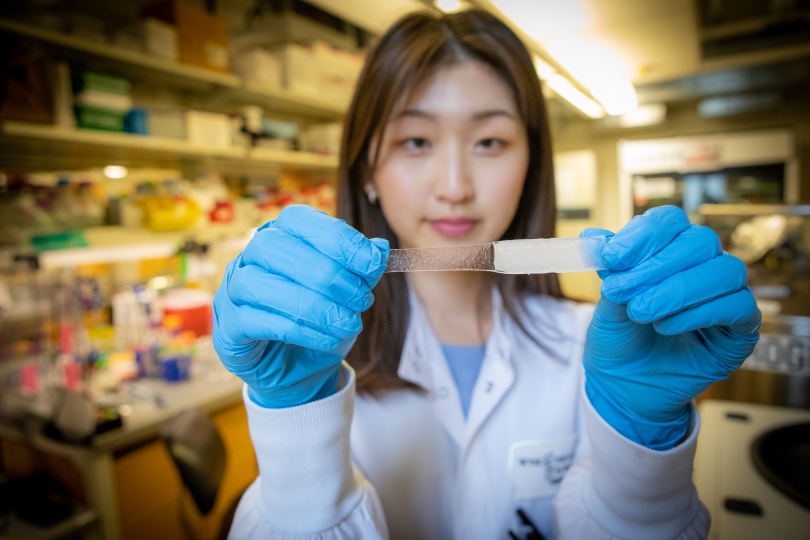Sometimes, all it takes is one lab experience for a student to discover their passion. Esther Koh arrived as a freshman not fully understanding what biotechnology and bioengineering really were, but still found herself drawn to the lab of David Mooney, Robert P. Pinkas Family Professor of Bioengineering at the Harvard John A. Paulson School of Engineering and Applied Sciences (SEAS).
Esther Koh, S.B. '22 in Engineering Sciences: Bioengineering (Eliza Grinnell/SEAS)
Four years later, Koh is still working with her mentor at the Mooney Lab. She has contributed to advances in adhesive hydrogels that can act as drug delivery systems, been a co-author on journal articles, presented at national conferences, and worked as a team member at the start-up Limax Biosciences, which recently won a $75,000 prize at the 2022 Harvard President’s Innovation Challenge Awards. She graduates this week with an S.B. in Engineering Sciences on the Bioengineering track, with a secondary in Global Health and Health Policy.
“I was always interested in biology and engineering,” Koh said. “I took engineering electives in high school, but that was more focused on mechanical and electrical engineering. When I saw how you could take those principles and apply them to look at and answer questions within the field of biology, that ultimately drew me to studying bioengineering. I was fascinated by the impact research in this area has on advancing human medicine and health. It was just a natural fit for me.”
Growing up in Riverside in the greater Los Angeles area, Koh got her first taste of Cambridge when she attended a high school camp at MIT. A subsequent campus visit to Harvard introduced her to her eventual field of study.
“Cambridge is a booming biotech hub, and I wanted to be part of this environment and learn more about it,” Koh said. “I was not aware of what biotech was until one of the campus tour guides brought it up, and I knew this was the right place to be in for continuing my education and looking into the biotech sphere.”
Throughout her time at SEAS, Esther Koh has worked with in the lab of David Mooney, Robert P. Pinkas Family Professor of Bioengineering at SEAS. (Eliza Grinnell/SEAS)
By January of her freshman year, Koh was working in the Mooney Lab. She’d go on to take multiple courses with Mooney, including a semester of ES96: Engineering Problem Solving and Design Project, that led to her first publication in a peer-reviewed journal.
“Professor Mooney had a really big impact on me starting from freshman year,” Koh said. “He’s very humble, very, very knowledgeable about his area. Of course, he’s a leading expert in tissue engineering. What inspired me the most, though, was the way the people in the lab look up to him, how he’s able to encourage such a collaborative and friendly lab environment, and how supportive he is of everyone, including the undergrad interns.”
Her work in the Mooney Lab and at the Wyss Institute for Biologically Inspired Engineering, where Mooney is a core faculty member, taught Koh all the stages of tech translation, from laboratory design to market implementation. That experience helped her co-found a biotech start-up of her own, Medela Gel, in 2020. Medela Gel pursued therapeutic treatments for patients with chronic wounds such as diabetic skin ulcers.
“It’s been really fascinating studying and talking with different physicians and nurses and seeing what they think the clinical impact of these gels are in practice. This philosophy of focusing on translatable science, from benchtop to bedside, will carry with me.”
Mooney has remained Koh’s mentor throughout her time at Harvard. He was the advisor for her senior capstone project, in which she developed a hydrogel that sought to improve tendon healing by recruiting immune response cells. Her thesis was one of seven to receive a Dean’s Award for Outstanding Engineering Project.
For her senior capstone project, Esther Koh developed a hydrogel that sought to improve tendon healing by recruiting immune response cells. She received a Dean’s Award for Outstanding Engineering Project. (Eliza Grinnell/SEAS)
“The tough adhesive hydrogel wasa material I wanted to continue working with for my thesis,” Koh said. “Right now, we’re focusing on tendon healing and delivering these specific proteins in a hybrid biomaterial system. But it’s not hard to imagine that we can use the same biomaterial to deliver different therapeutics to help healing in various tissue systems.”
Benjamin Freedman, a postdoctoral fellow in the Mooney Lab, was another mentor critical to Koh’s success over the last four years. She's tried to pay that mentorship forward through numerous extracurricular activities and organizations, serving as co-captain of the Peer Concentration Advisors and co-president of Women in Business, and helping lead the Society of Women Engineers and the Harvard Association for US-China Relations, among other activities.
“Mentorship has definitely become a core part of what I want to engage in in the future,” Koh said. “Helping guide freshmen and underclassmen start exploring their many interests and curiosities really fuels my passion for education.”
Koh won’t drift too far from campus next year. She’s been accepted to the Harvard-MIT Program in Health Sciences and Technology (HST), where she’ll pursue her Ph.D. in Medical Engineering and Medical Physics. She’s already had some experience with Harvard Medical School, having worked in the lab of George Church, Robert Winthrop Professor of Genetics.
“The HST program focuses on advancing the engineering, technical skills and background, developing that within an MIT engineering program, while also having the chance to take clinical classes and rotations at Harvard Medical School,” Koh said. “I’ll be able to actually see where a medical device or project can be incorporated into the clinic and help patients.”
Joining the HST program means leaving the lab that’s been her home for the last four years, but Koh is definitely ready.
“Esther is really on a great career trajectory as a researcher,” Mooney said. “There are some incredible students at Harvard College, and Esther is clearly among the very best of our graduating seniors. She is simply outstanding.”
Press Contact
Matt Goisman | mgoisman@g.harvard.edu


